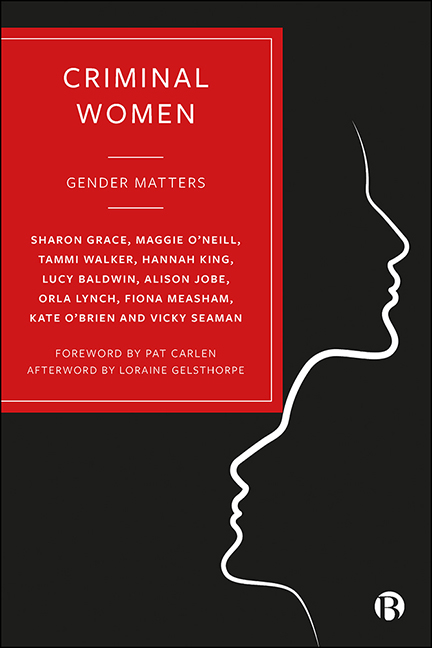Book contents
- Frontmatter
- Contents
- List of Figures and Table
- Notes on the Authors
- Acknowledgements
- Foreword
- Introduction
- 1 Hearing the Voices of Women Involved in Drugs and Crime
- 2 Knifing Off? The Inadequacies of Desistance Frameworks for Women in the Criminal Justice System in Ireland
- 3 Sex Work, Criminalisation and Stigma: Towards a Feminist Criminological Imagination
- 4 Criminal Women in Prison Who Self-harm: What Can We Learn from Their Experiences?
- 5 Criminal Mothers: The Persisting Pains of Maternal Imprisonment
- 6 ‘The World Split Open’: Writing, Teaching and Learning with Women in Prison
- 7 Women’s Biographies through Prison
- Afterword
- Index
Foreword
Published online by Cambridge University Press: 15 September 2022
- Frontmatter
- Contents
- List of Figures and Table
- Notes on the Authors
- Acknowledgements
- Foreword
- Introduction
- 1 Hearing the Voices of Women Involved in Drugs and Crime
- 2 Knifing Off? The Inadequacies of Desistance Frameworks for Women in the Criminal Justice System in Ireland
- 3 Sex Work, Criminalisation and Stigma: Towards a Feminist Criminological Imagination
- 4 Criminal Women in Prison Who Self-harm: What Can We Learn from Their Experiences?
- 5 Criminal Mothers: The Persisting Pains of Maternal Imprisonment
- 6 ‘The World Split Open’: Writing, Teaching and Learning with Women in Prison
- 7 Women’s Biographies through Prison
- Afterword
- Index
Summary
One summer's evening in 1984 seven women met in Central London in response to a proposal by Chris Tchaikovsky, Founder of Women in Prison (WIP), that we form a group to campaign against women's imprisonment. All except me, and the partner of one of the other women, had been in prison. I was there at the invitation of Chris who, having read my recently published book Women's Imprisonment, thought that I might be useful to the group, though it was decided that only ex-prisoners were eligible for full membership. So, the campaigning group WIP was born, and several more foundational meetings followed. And it was at one of those very early 1984 meetings that we decided to write a book to publicise both the harms of women's imprisonment and the real-life stories of women sent to prison and thereafter too frequently stereotyped as ‘other’ – other than real women, other than real mothers and other than real criminals; as women, in short, whom prisons must feminise, domesticise and medicalise.
Four women volunteered to tell their stories, though each wanted to work in a different way. It was agreed that I would be overall editor and second-named co-author for three of the chapters, and that royalties would be shared between the four main authors. Only Chris chose to write her story by herself, and this she did, though we had several shouty arguments at the editorial stage. Jenny Hicks, a founding member of the Clean Break Theatre Company, also elected to write her own story and did so until she felt bogged down by detail in the last third, after which she typed the remainder before we edited together and highlighted some of the recurring themes. Diana Christina decided to tape and re-tape her story with me – alternately inserting commentary she approved of and then deleting it as she later changed her mind. This took hours, then weeks and then months – as several major theoretical arguments erupted and editor and author standoffs occurred along the way; and during which time the whole project was abandoned by all of us more than once.
- Type
- Chapter
- Information
- Criminal WomenGender Matters, pp. viii - xPublisher: Bristol University PressPrint publication year: 2022

